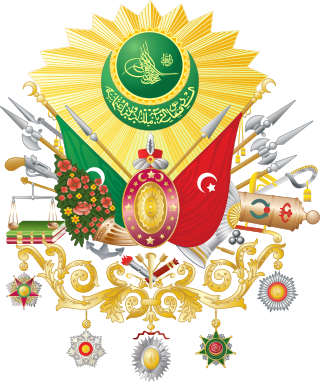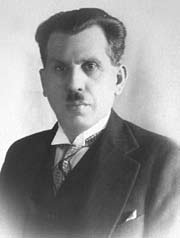
The Greek War of Independence, also known as the Greek Revolution or the Greek Revolution of 1821, was a successful war of independence by Greek revolutionaries against the Ottoman Empire between 1821 and 1829. In 1826, the Greeks were assisted by the British Empire, Kingdom of France, and the Russian Empire, while the Ottomans were aided by their North African vassals, particularly the eyalet of Egypt. The war led to the formation of modern Greece, which would be expanded to its modern size in later years. The revolution is celebrated by Greeks around the world as independence day on 25 March every year.
The Treaty of London was signed in London on 6 July, 1827 by the United Kingdom of Great Britain and Ireland, Bourbon Restoration France and the Russian Empire. The three main European powers had called upon Greece and the Ottoman Empire to cease hostilities that had been going on since the Greeks revolted against the Ottoman rule on 17 March 1821. After years of negotiation, the European allied powers had finally decided to intervene in the war on the side of the Greeks. The Allied powers wanted the treaty mainly to cause the Ottoman Empire to create an independent Greek state. It stated that while the Ottoman Empire would recognise the independence of Greece, the Ottoman Sultan would be the supreme ruler of Greece. The treaty declared the intention of the three allies to mediate between the Greeks and the Ottomans. The base arrangement was that Greece would become an Ottoman dependency and pay tribute as such. Additional articles were added to detail the response if the Sultan refused the offer of mediation and continued hostilities in Greece. The articles detailed that the Turks had one month to accept the mediation or the Allied powers forming a partnership with the Greeks through commercial relations. Measures were also adopted that if the Sultan refused the armistice, the Allies would use the appropriate force to ensure the adoption of the armistice.

The Turkish War of Independence was a series of military campaigns and a revolution waged by the Turkish National Movement, after parts of the Ottoman Empire were occupied and partitioned following its defeat in World War I. The conflict was between the Turkish Nationalists against Allied and separatist forces over the application of Wilsonian principles, especially national self-determination, in post-World War I Anatolia and Eastern Thrace. The revolution concluded the collapse of the Ottoman Empire; the Ottoman monarchy and the Islamic caliphate were abolished, and the Republic of Turkey was declared in Anatolia and Eastern Thrace. This resulted in a transfer of vested sovereignty from the sultan-caliph to the nation, setting the stage for Republican Turkey's period of nationalist revolutionary reform.

The Ottoman Empire was founded c. 1299 by Osman I as a small beylik in northwestern Asia Minor just south of the Byzantine capital Constantinople. In 1326, the Ottomans captured nearby Bursa, cutting off Asia Minor from Byzantine control. The Ottomans first crossed into Europe in 1352, establishing a permanent settlement at Çimpe Castle on the Dardanelles in 1354 and moving their capital to Edirne (Adrianople) in 1369. At the same time, the numerous small Turkic states in Asia Minor were assimilated into the budding Ottoman sultanate through conquest or declarations of allegiance.
There have been several Greco-Turkish Wars:

A series of military conflicts between the Ottoman Empire and various European states took place from the Late Middle Ages up through the early 20th century. The earliest conflicts began during the Byzantine–Ottoman wars, waged in Anatolia in the late 13th century before entering Europe in the mid-14th century with the Bulgarian–Ottoman wars. The mid-15th century saw the Serbian–Ottoman wars and the Albanian-Ottoman wars. Much of this period was characterized by Ottoman expansion into the Balkans. The Ottoman Empire made further inroads into Central Europe in the 15th and 16th centuries, culminating in the peak of Ottoman territorial claims in Europe.

The military history of Greece is the history of the wars and battles that took place in Greece, the Balkans, and the Greek colonies in the Mediterranean Sea and the Black Sea, respectively, since classical antiquity.

The Battle of Phaleron or Battle of Analatos took place on 6 May 1827, during the Greek War of Independence. The Greek rebel forces were being besieged inside the Acropolis of Athens by Ottoman forces under the command of Mehmed Reshid Pasha. Greek forces outside the city were desperately trying to break the siege.
Mareşal (transl. Marshal) is the highest rank in the Turkish Land Forces and Turkish Air Force. It is the equivalent of a Field marshal in other countries.

Russo-Turkish wars or Russo-Ottoman wars were a series of twelve wars fought between the Russian Empire and the Ottoman Empire between the 16th and 20th centuries. It was one of the longest series of military conflicts in European history. Except for the war of 1710–11, as well as the Crimean War which is often treated as a separate event, the conflicts ended disastrously for the Ottoman Empire, which was undergoing a long period of stagnation and decline; conversely, they showcased the ascendancy of Russia as a European power after the modernization efforts of Peter the Great in the early 18th century.

Mehmet Kâzım Orbay was a Turkish general and senator. He served as the third Chief of the General Staff of the Turkish Armed Forces.

The Ottoman Navy or The Imperial Navy, also known as the Ottoman Fleet, was the naval warfare arm of the Ottoman Empire. It was established after the Ottomans first reached the sea in 1323 by capturing Praenetos, the site of the first Ottoman naval shipyard and the nucleus of the future navy.

The Battle of Vasilika was fought between Greek revolutionaries and the Ottoman Empire during the Greek War of Independence.
Yakup Satar is believed to have been the last Ottoman veteran of the First World War. He died at age 110.

Kâzım Özalp was a Turkish military officer of Albanian descent, politician, and one of the leading figures in the Turkish War of Independence.

The Battle of Doliana occurred on 30 May 1821 N.S. during the Greek War of Independence when Greek revolutionaries defeated the forces of the Ottoman Empire at Doliana in the Morea province of the Ottoman Empire.

Abdullah Pasha or Abdullah Kölemen (1846–1937) was an Ottoman general in the First Balkan War, notable as the Ottoman commander in the Battle of Kirk Kilisse in 1912, the Battle of Lule Burgas, and the Battle of Adrianople (1913) in which the Ottoman forces were defeated by the Bulgarians.